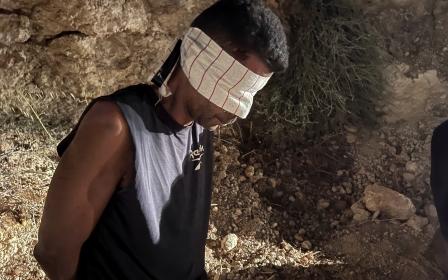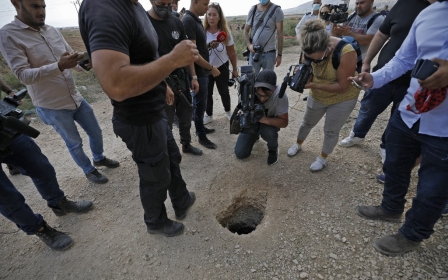Israel: Recaptured Palestinian jailbreakers transferred to solitary confinement

Israel's Prison Service (IPS) has moved to solitary confinement the six Palestinian detainees rearrested after escaping from Gilboa jail earlier in September. Their transfer was made on Thursday.
The escape of the six inmates from a single cell, using tools as simple as a spoon to tunnel out of the maximum-security prison via the toilet floor, has earned them hero status in Palestine and the Arab world.
They were all recaptured about a week after their escape, and an investigation has been launched.
After days of pursuit, Israeli forces managed to arrest four escapees separately near Nazareth: Mahmoud Abdullah Ardah, Yaqoub Mahmoud Qadri, Mohamed Qassem Ardah and Zakaria Zubeidi. The last two, Ayham Kamanji and Munadil Nfeiat, were arrested days later in the city of Jenin, their hometown, after turning themselves in without resistance.
New MEE newsletter: Jerusalem Dispatch
Sign up to get the latest insights and analysis on Israel-Palestine, alongside Turkey Unpacked and other MEE newsletters
Khaled Mahajna, the lawyer of Mohamed Ardah, wrote on Facebook on Friday that after Israeli authorities concluded the investigations with the prisoners over their successful jailbreak, they were moved to solitary incarceration in different jails. Mahajna described the IPS decision as "arbitrary".
According to Karim Ajwa, a lawyer in the Palestinian Authority's Prisoners and Freed Prisoners Committee, Ardah has been placed in a small and dirty cell in Ashkelon prison. He is being monitored constantly in solitary confinement, including when he uses the toilet, depriving him of privacy. He is considering a hunger strike if his prison conditions worsen in the coming days, Ajwa said.
Meanwhile, Zubeidi is being held in the notorious desert prison of Eshel in the Negev, in southern Israel. Kamanji has been moved to solitary confinement in Ohli Kedar prison, also in the Negev; Qadri to Rimonim prison, and Nfeiat and Mahmoud Abdullah Ardah to Ayalon prison in Ramla.
The PA's Prisoners Committee said that Israel intensified its pressure on Palestinian prisoners inside its jails, viewing them as "dangerous and a source of threat".
The Committee said Israel had started a campaign to transfer prisoners between jails, so each Palestinian prisoner will not spend more than six months in the same cell and no more than a year in the same prison section.
Meanwhile, Hazem Qasem, Hamas' spokesperson, said that "Israel is attempting to procure revenge from those prisoners and put them in solitary confinement.
"This retaliatory behaviour manifests the extent of [the jailbreak] insult posed to the administration of the occupation prisons and the entire Israeli security system." Qasem added that Israel uses solitary confinement to "break the will of the prisoners, but each time it fails".
Following the recapture of the six Palestinian prisoners, Hamas, the Palestinian movement that controls the Gaza Strip, vowed to include their names in any future prisoners exchange list with Israel.
Solidarity in spoons
Gilboa prison opened in 2004, and was described by one official at IPS as "more secure than the Bank of Israel's safes".
According to the lawyer for Mahmoud Ardah, the mastermind of the operation, the jailbreak had been planned for months, and the digging of the escape tunnel started in December. He told AFP that Ardah used spoons, plates and the handle of a kettle to dig the tunnel from inside the prison cell.
Palestinian protesters have been holding spoons during demonstrations to show solidarity with the escapees and all Palestinian prisoners in Israeli jails.
Middle East Eye delivers independent and unrivalled coverage and analysis of the Middle East, North Africa and beyond. To learn more about republishing this content and the associated fees, please fill out this form. More about MEE can be found here.




